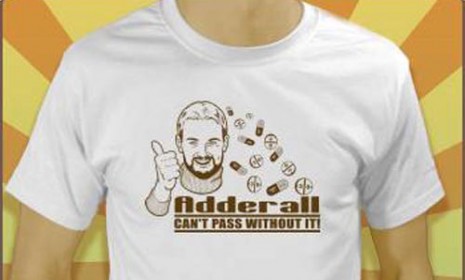The confounding rise of teens abusing 'good-grade pills'
American schools have a drug problem, The New York Times reports, and it isn't with slackers doping up and dropping out

A free daily email with the biggest news stories of the day – and the best features from TheWeek.com
You are now subscribed
Your newsletter sign-up was successful
It's hardly news that high school kids sometimes abuse drugs, but The New York Times puts a twist on that well-worn story by looking at the rise of teenagers taking prescription stimulants like Adderall, Vyvanse, and Ritalin to improve their academic performance. Those amphetamines and methylphenidates are federal Class 2 controlled substances (like cocaine and morphine), and many students either lie to psychiatrists to get prescriptions for nonexistent ADHD, or buy them from teens who have prescriptions. Here, six things to know about these "good-grade pills":
1. These aren't recreational drugs
Abuse of Adderall and other "study drugs" is a particular problem in elite high schools, where they're used "by conscientious students to work harder and meet ever-rising academic expectations," says Alan Schwarz in The New York Times. The pills sell for $5 to $20 a pop, and the main customers are "the quote-unquote good kids," says a pill dealer in a suburban Philadelphia high school. Adderall and other amphetamine "abuse is not like the abuse of recreational drugs," says Mark Kleiman at The Reality-Based Community. "The risks and the motivations of the users are different."
The Week
Escape your echo chamber. Get the facts behind the news, plus analysis from multiple perspectives.

Sign up for The Week's Free Newsletters
From our morning news briefing to a weekly Good News Newsletter, get the best of The Week delivered directly to your inbox.
From our morning news briefing to a weekly Good News Newsletter, get the best of The Week delivered directly to your inbox.
2. "Study drugs" are like steroids... for your brain
A Connecticut high school senior tells The New York Times that Adderall and its competitors "are academic steroids," and sometimes tacitly or actively encouraged by parents. But while "the ethics and fairness of using performance-enhancing drugs is routinely challenged in sports," says Dr. Lawrence Diller at The Huffington Post, there's no consensus about such drug use in academia. That means the default is "it's okay to use a drug to improve your school performance if [you have] a disorder, but it's 'cheating' if you don't have a real problem and are just using it because you want to get ahead or you're a slacker."
3. Fair or not, the drugs work
These drugs really do help non-ADHD students overperform on tests and school work, says Kleiman. And given the boost in focus and information-retention students get, "it's understandable that kids desperate for an academic advantage would turn to stimulants," says Matthew Herper at Forbes. "Why shouldn't they?" In fact, maybe "the test-takers, not the psychiatric profession, have the right idea about these medicines": Use them infrequently, when needed, not daily for life.
A free daily email with the biggest news stories of the day – and the best features from TheWeek.com
4. But the long-term consequences can be ugly
There haven't been any long-term studies on the effects of stimulant abuse by teenagers, but we do know that users eventually crash: Depression, mood swings, irregular or rapid heartbeats, and extreme exhaustion are real risks, and Adderall can turn students on to harder drugs. High schoolers also take the drugs in greater doses, and more direct ways (mostly snorting), than doctors recommend, says Forbes' Herper. "It doesn't take a huge dose of stimulant to increase focus, but a high school kid isn't likely to ramp up slowly. And these drugs can be addictive."
5. Kids aren't the only ones abusing Adderall
Some parents aren't only encouraging their children to get ahead with amphetamines, they're stealing from their kids' stash, says David Moore in the New York Daily News. According to federal data, some 30 percent of grown women say they share their prescription drug stash with friends and relatives. These moms borrow "their kids' Adderall or Ritalin to 'get through their day,'" and while "that type of sharing may not be a Mexican drug cartel... it's an underground drug network that is making the CDC plenty worried."
6. This issue is vexing experts
The abuse of good-grade pills poses a thorny policy problem, says Kleiman. We shouldn't ignore it, but "it would be a mistake to treat this as an opportunity to open one more front in the drug wars." Our "existing ways of thinking about 'drug abuse'" are geared toward people tuning out, but "these kids aren't partying: They're working." That leaves us with a "smart-for-one-dumb-for-all" conundrum: Taking Adderall does give a genuine competitive advantage to students, but "they'd be better off, as a group, if no one was using."
Sources: Forbes, Huffington Post, New York Daily News, New York Times (2), Reality-Based Community
-
 The Olympic timekeepers keeping the Games on track
The Olympic timekeepers keeping the Games on trackUnder the Radar Swiss watchmaking giant Omega has been at the finish line of every Olympic Games for nearly 100 years
-
 Will increasing tensions with Iran boil over into war?
Will increasing tensions with Iran boil over into war?Today’s Big Question President Donald Trump has recently been threatening the country
-
 Corruption: The spy sheikh and the president
Corruption: The spy sheikh and the presidentFeature Trump is at the center of another scandal